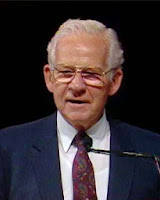"Whoever we are, and whatever our problems, his response is always the same—forever. 'Come unto me' (Matt. 11:28). Come see what I do and how I spend my time. Learn of me, follow me, and in the process I will give you answers to your prayers and rest to your souls.
"I know of no other way for you to be able to carry your burdens or find what Jacob called 'that happiness which is prepared for the saints' (2 Ne. 9:43). That is why we make solemn covenants based on Christ's atoning sacrifice, why we take upon us his name.
"In as many ways as possible, both figuratively and literally, we try to take upon us his identity. We seek out his teachings and retell his miracles. We send latter-day witnesses, including prophets, apostles, and missionaries, around the world to declare his message. We call ourselves his children and we testify that he is the only source of eternal life. We plead for him to swing open the gates of heaven in our behalf, and trust everlastingly that he will, based upon our faithfulness.
"My desire for you is to have more straightforward experience with the Savior's life and teachings. Perhaps sometimes we come to Christ too obliquely, focusing on structure or methods or elements of Church administration. Those are important, but not without attention to the weightier matters of the kingdom, first and foremost of which is a personal spiritual relationship with Deity, including the Savior whose kingdom this is."
- Jeffrey R. Holland, "Come and See," adapted from a Church Education System fireside address delivered March 2, 1997. See New Era, Dec. 1997, pp. 4-8; Ensign, April 1998, pp. 16-23
Click here to read the full talk
Elder Holland has a way of sharing thoughts and invitations that speak right to the heart. In describing the Savior's love for each of us, he does that in a powerful way in this quote. He interprets the Savior's invitation to "Come unto me" as a beckoning call to "Come see what I do and how I spend my time. Learn of me, follow me, and in the process I will give you answers to your prayers and rest to your souls." The goal is to "try to take upon us his identity" and become more and more like Him in every way. We do that through our direct, personal experiences with His life and teachings:
In the establishment of that "personal spiritual relationship with Deity," we unlock the door to His love and blessings in our lives. That is certainly worth every effort to obtain and achieve!
(Compilation and commentary by David Kenison, Orem, Utah, 2022)
June 26, 2016
June 26, 2016





























